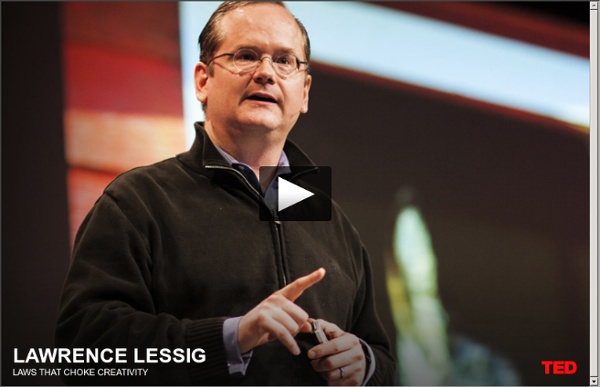



http://www.ted.com/talks/larry_lessig_says_the_law_is_strangling_creativity.html
The 20 most-watched TEDx talks so far News X marks the spot: This week’s TEDxTalks Each week, TEDx chooses four of our favorite talks, highlighting just a few of the enlightening speakers from the TEDx community, and its diverse constellation of ideas worth spreading. Below, give this week’s talks a listen. Fighting Duchenne muscular dystrophy: Dr. Benjy Seckler at TEDxBerkshires Potential medicines, especially for rare genetic diseases, take years to […] What is Plagiarism When Everything is a Remix? pic via Brainpickings "The modern concept of plagiarism as immoral and originality as an ideal emerged in Europe only in the 18th century, particularly with the Romantic movement." wiki Is it time to rethink what Plagiarism is? If you ask me: Yes!
information « relationary.wordpress I was passed this link to a free Knowledge Management Course by a friend today. I gave the entire course a read (it is not that long) and concluded that there was only one thing that the course covered that is not covered by the Six Hats, Six Coats as it has been explained so far. The issue is valuation, how do we know the cost/benefit of any fact. Otherwise, the authors wave the term “knowledge” around with little restraint to the point of its being meaningless. If they had it their way, everything would be knowledge. Plagiarism Plagiarism is not a crime per se but in academia and industry, it is a serious ethical offense,[6][7] and cases of plagiarism can constitute copyright infringement. Etymology[edit] In the 1st century. the use of the Latin word plagiarius (literally kidnapper), to denote someone stealing someone else's work, was pioneered by Roman poet Martial, who complained that another poet had "kidnapped his verses." This use of the word was introduced into English in 1601 by dramatist Ben Jonson, to describe as a plagiary someone guilty of literary theft.[6][8] The derived form plagiarism was introduced into English around 1620.[9] The Latin plagiārius, "kidnapper", and plagium, "kidnapping", has the root plaga ("snare", "net"), based on the Indo-European root *-plak, "to weave" (seen for instance in Greek plekein, Bulgarian "плета" pleta, Latin plectere, all meaning "to weave"). Legal aspects[edit]
Pro-Ams: The Rise Of The Amateur Professionals, Prosumers, Passionate Amateurs "A number of factors are coming together to empower amateurs in a way never before possible, blurring the lines between those who make and those who take. Unlike the dot-com fortune hunters of the late 1990s, these do-it-yourselfers aren't deluding themselves with oversized visions of what they might achieve. Instead, they're simply finding a way--in this mass-produced, Wal-Mart world--to take power back, prove that they can make the products that they want to consume, have fun doing so, and, just maybe, make a few dollars." Passionate amateurs have in fact attracted the attention of both large corporations as well as the one of mainstream news sources, who have recently started to devote quite a bit of attention to this new spreading phenomenon.
User innovation User innovation refers to innovation by intermediate users (e.g. user firms) or consumer users (individual end-users or user communities), rather than by suppliers (producers or manufacturers).[1] Eric von Hippel [2] and others observed that many products and services are actually developed or at least refined, by users, at the site of implementation and use. These ideas are then moved back into the supply network. This is because products are developed to meet the widest possible need; when individual users face problems that the majority of consumers do not, they have no choice but to develop their own modifications to existing products, or entirely new products, to solve their issues.
Amateur professionalism Amateur professionalism or professional amateurism (shortened to am pro, AmPro, Am-Pro, pro am, ProAm, Pro-Am, etc.) is a socioeconomic concept that describes a blurring of the distinction between professional and amateur within any endeavour or attainable skill that could be labelled professional, whether it is in the field of writing, computer programming, music, film, etc. When speaking of persons, the terms amateur professionals, amateur pros, am pros, professional amateurs, professional ams or pro ams may be used. The idea is distinct from the sports term "pro–am" (professional–amateur), though related to and ultimately derived from it. Amateur professionalism occurs in populations that have more leisure time and live longer, allowing the pursuit of hobbies and other non-essential interests at a professional or near-professional knowledge- and skill-level. See also[edit] User innovation
rd_matematicas_t2_ 9 Adobe Connect requires Flash Player 10.3 or above. Adobe Connect requires the Flash Player plugin, version 10.3 or above. Please download and install the Flash Player to continue. Copyright © 2001 - 2012 Adobe Systems Incorporated and its licensors. All rights reserved.